- Home
- David Liss
The Devil's Company bw-3
The Devil's Company bw-3 Read online
The Devil's Company
( Benjamin Weaver - 3 )
David Liss
From the acclaimed and bestselling author ofThe Whiskey RebelsandA Conspiracy of Papercomes a stunning new thriller set in the splendor and squalor of eighteenth-century London.
The year is 1722. Ruffian for hire and master of disguise Benjamin Weaver finds himself pitted against a mysterious mastermind who holds the lives of Weaver's friends in the balance. To protect the people he loves, Weaver must stage a daring robbery from the headquarters of the ruthless British East India Company, but this theft is only the opening move in a dangerous game of secret plots, corporate rivals, and foreign spies. With the security of the nation--and the lives of those he loves--in the balance, Weaver must navigate a labyrinth of political greed and corporate treachery.
Explosive action and utterly vivid period detail are the hallmarks of an author who continues to set the bar...
ALSO BY DAVID LISS
A Conspiracy of Paper
The Coffee Trader
A Spectacle of Corruption
The Ethical Assassin
The Whiskey Rebels
CHAPTER ONE
N MY YOUTH I SUFFERED FROM TOO CLOSE A PROXIMITY TO GAMING tables of all descriptions, and I watched in horror as Lady Fortune delivered money, sometimes not precisely my own, into another’s hands. As a man of more seasoned years, one poised to enter his third decade of life, I knew far better than to let myself loose among such dangerous tools as dice and cards, engines of mischief good for nothing but giving a man false hope before dashing his dreams. However, I found it no difficult thing to make an exception on those rare occasions when it was another man’s silver that filled my purse. And if that other man had engaged in machination that would guarantee that the dice should roll or the cards turn in my favor, so much the better. Those of overly scrupulous morals might suggest that to alter the odds in one’s favor so illicitly is the lowest depth to which a soul can sink. Better a sneak thief, a murderer, even a traitor to his country, these men will argue, than a cheat at the gaming table. Perhaps it is so, but I was a cheat in the service of a generous patron, and that, to my mind, quieted the echoes of doubt.
I begin this tale in November of 1722, some eight months after the events of the general election of which I have previously written. The rancid waters of politics had washed over London, and indeed the nation, earlier that year, but once more the tide had receded, leaving us none the cleaner. In the spring, men had fought like gladiators in the service of this candidate or that party, but in the autumn matters sat as though nothing of moment had transpired, and the connivances of Parliament and Whitehall galloped along as had ever been their custom. The kingdom would not face another general election for seven years, and in retrospect people could not quite recollect what had engendered the fuss of the last.
I had suffered many injuries in the events of the political turmoil, but my reputation as a thieftaker had ultimately enjoyed some benefits. I received no little notoriety in the newspapers, and though much of what the Grub Street hacks had to say of me was utterly scurrilous, my name had emerged somehow augmented, and since that time I had suffered no shortage of knocks upon my door. There were certainly those who might now stay away, fearing that my exploits had an unpleasant habit of attracting attention, but many more gazed with favor upon the idea of hiring a man such as myself, one who had fought pitched battles as a pugilist, escaped from Newgate Prison, and shown his mettle in resisting the mightiest political powers in the kingdom. A fellow who can do such things, these men reasoned, can certainly find that scoundrel who owes thirty pounds; he can find the name of the villain who plots to run off with a high-spirited daughter; he can bring to justice the rascal who stole a watch.
Such was the beer and meat of my trade, but, too, there were those who made more uncommon uses of my talents, which was why I found myself that November night in Kingsley’s Coffeehouse, once a place of little reputation but now something far more vivacious. Kingsley’s had been for the past season a gaming house of considerable fashion among the bon ton, and perhaps it would continue to enjoy this position for another season or two. The wits of London could not embrace this amusement or that for too long before they grew weary, but for the nonce Mr. Kingsley had taken full advantage of the good fortune granted him.
While during daylight hours a man might still come in for a dish of coffee or chocolate and enjoy reading a newspaper or hearing one read to him, come sundown he would need a constitution of iron to attend to dry words. Here now were nearly as many whores as there were gamers, and fine-looking whores at that. Search not at Kingsley’s for diseased or half-starved doxies from Covent Garden or St. Giles. Indeed, the paragraph writers reported that Mrs. Kingsley herself inspected the jades to ensure they met her exacting standards. On hand as well were musicians who played lively ditties while an unnaturally slender posturer contorted his death’s head of a face and skeletal body into the most unlikely shapes and attitudes—all while the crowd duly ignored him. Here were middling bottles of claret and port and Madeira to please discriminating men too distracted to discriminate. And here, most importantly, were the causes of the distraction: the gaming tables.
I could not have said what made Kingsley’s tables rise from obscurity to glory. They looked much like any other, and yet the finest people of London directed their coachmen to this temple of fortune. After the play, after the opera, after the rout and the assembly, Kingsley’s was the very place. Playing at faro were several well-situated gentlemen of the ministry, as well as a member of the House of Commons, more famous for his lavish parties than for his skills as a legislator. Losing at piquet was the son of the duke of Norwich. Several sprightly beaux tried to teach the celebrated comedienne Nance Oldfield to master the rules of hazard—and good luck to them, for it was a perplexing game. The great brought low and the low raised high—it all amused and entertained me, but my disposition mattered little. The silver in my purse and the bank notes in my pocket were not mine to wager according to my own inclinations. They were marked for the shame of a particular gentleman, one who had previously humiliated the man on whose behalf I now entered a contest of guile and deceit.
I spent a quarter of an hour walking through Kingsley’s, enjoying the light of countless chandeliers and the warmth of their fires, for winter had come hard and early that year, and outside all was ice and bitter cold. At last, grown warm and eager, with the music and laughter and the enticements of whores buzzing in my head, I began to formulate my plan. I sipped at thinned Madeira and sought out my man without seeming to seek out anyone. Such was an easy task, for I had dressed myself as a beau of the most foppish sort, and if the nearby revelers took notice of me they saw only a man who wished to be noticed, and what can be more invisible than that?
I wore an emerald-and-gold outer coat, embroidered almost beyond endurance, a waistcoat of the same color but opposing design, bright with brass buttons of some four inches in diameter. My breeches were of the finest velvet, my shoes more silver buckle than shiny leather, and the lace of my sleeves blossomed like frilly blunderbusses. That I might go unrecognized should anyone there know my face, I also wore a massive wig of the wiry sort that was fashionable that year among the more peacockish sort of man.
When the time and the circumstances seemed to me as I wished them, I approached the cacho table and came upon my man. He was a fellow my own age or thereabouts, dressed very expensively but without the frills and bright colors in which I’d costumed myself. His suit was of a sedate and dark blue with red trim, embroidered tastefully with gold thread, and he looked quite well in it. In truth, he had a handsome face beneath his short bob wig. At his table, he contemplated with t
he seriousness of a scholar the three cards in his hand and said something in the general direction of the ample breasts belonging to the whore upon his lap. She laughed, which I suspected was in no small degree how she earned her master’s favor.
This man was Robert Bailor. I had been hired by a Mr. Jerome Cobb, whom it seemed Bailor had humiliated in a game of chance, the outcome of which, my patron believed, owed more to chicanery than fortune. The tale I had been told unfolded accordingly: Subsequent to losing a great deal of money, my patron had discovered that Bailor possessed the reputation of a gamer who misliked the randomness of chance as much as he misliked duels. Mr. Cobb, acting upon his prerogative as a gentleman, challenged this Bailor, but Bailor had insolently excused himself, leaving the injured gentleman with no option but perfidy of his own
Needing a man to act as his agent in these matters, he had sought me out and addressed his needs to me. I was, according to Mr. Cobb’s instruction, to manufacture a battle of cards with Bailor. Mr. Cobb had employed me to that end, but I was not the only one in his pay. So, too, was a particular card dealer at Kingsley’s, who was to make certain I lost when I wished to lose and, more importantly, won when I wished to win. Once I had succeeded in humiliating Mr. Bailor before as large a crowd as I could muster, I was to whisper to him, so that no other ears might hear, that he had felt the long reach of Mr. Cobb.
I approached the red velvet cacho table and stared for a moment at Bailor’s whore and then for another moment at Bailor himself. Mr. Cobb had informed me of every known particularity of his enemy’s character, among them that Bailor had no love for the gaze of strangers and loathed a fop above all things. A staring fop could not fail to attract his notice.
Bailor set down his three cards upon the table and the other two players did as well. After a smirk, he gathered the pile of money to himself. He slowly raised to me a pair of narrow eyes. The light was such that I could observe their dull gray color and that they were well lined with red, sure signs of a man who has been at play too long, has enjoyed his spirits overmuch, and is vastly in need of sleep.
Though somewhat hampered by bushy brows and a flattened nose with wide and flaring nostrils, he also possessed strong cheekbones and a square chin, and he was built like a man who enjoyed riding more than beef or beer. He therefore had something commanding about him.
“Direct your eyes elsewhere, sir,” he told me, “or I shall teach you the manners your education has sadly omitted.”
“Och, you’re a rude one, ain’t you, laddie?” I said, affecting the accent of a Scotsman, for in addition to fops, I had been made to understand that Bailor detested North Britons, and I was fully outfitted to attract his ire. “I was only having a wee peek at the lassie you’ve got ’pon you. Perhaps, as you’re not using her for aught but a lap warmer, you might lend her to me for a spell.”
His eyes narrowed. “I hardly think you would know what to do with a woman, Sawny,” he answered, using that name so insulting to Scotsmen.
For my part, I pretended to hold myself above such abuse. “I ken I wouldn’t let her turn stale while I sat playing at card games. I ken as much as that.”
“You offend me, sir,” he said. “Not only with your odious words but with your very being, which is an affront to this city and this country.”
“I canna answer for that. Your offense is your own. Will you lend me the lassie or no?”
“No,” he said quietly. “I shan’t. What I shall do is challenge you to a duel.”
This drew a gasp, and I saw that a crowd had gathered to watch us. Some twenty or thirty spectators—sharply dressed beaux with cynical laughs and their painted ladies—pulled in close now, whispering excitedly among themselves, fans flapping like a great mass of butterflies.
“A duel, you say?” I let out a laugh. I knew what he meant but pretended to ignorance. “If your honor is so delicate a thing, then I’ll help you see who is the man of the two of us. Have ye in mind blades or pistols, then? I promise ye, I am equally partial to both.”
He answered with a derisive bark and a toss of the head, as though he could not believe there was still a backwards creature who dueled with instruments of violence. “I have no time for such rude displays of barbarism. A duel of the cards, Sawny, if you are willing. Do you know cacho?”
“Aye, I ken it. ’Tis an amusement for lassies and ladies and little boys who haven’t yet the hair on their chests, but if it is your amusement too I’ll not shrink from your wee challenge.”
The two gentlemen who had previously sat at his table now vacated, standing back that I might take one of the seats. I did so and, with the greatest degree of subtlety, glanced at the dealer of cards. He was a squat man with a red birthmark on his nose—just the fellow my employer, Mr. Cobb, had described to me. We exchanged the most fleeting of glances. All progressed in accordance with the plan.
“Another glass of this Madeira,” I called out, to whatever servant might hear me. I removed from my coat an elaborately carved ivory snuffbox and with all deliberate slowness and delicacy took a pinch of the loathsome stuff. Then, to Mr. Bailor, I said, “What have ye in mind then, laddie? Five pounds? Is ten too much for ye?”
His friends laughed. He sneered. “Ten pounds? You must be mad. Have you never been to Kingsley’s before?”
“It’s me first time in London, for all it matters. What of it? I can assure ye that my reputation is secure in my native land.”
“I know not what back alley of Edinburgh from which you come—”
I interrupted him. “’Tis not right you address me so. Ken ye I’m the Laird of Kyleakin?” I boomed, having only a poor notion of where Kyleakin was or if it was a significant enough place to have a laird at all. I did know that half the North Britons in the metropolis claimed to be laird of something, and the title earned the claimant more derision than respect.
“I have no concern for what bog you call home,” Bailor said. “Know you that at Kingsley’s no one plays for less than fifty pounds. If you cannot wager such an amount, get out and cease corrupting the air I breathe.”
“Fie on your fifty pounds. ’Tis no more than a farthing to me.” I produced a pocketbook, from which I retrieved two banknotes of twenty-five pounds each.
Bailor inspected them to ascertain their legitimacy, for neither counterfeit notes nor the promise of a dissolute laird of Kyleakin would answer his purposes. These, however, came from a local goldsmith of some reputation, and my adversary was satisfied. He threw in two banknotes of his own, which I picked up and proceeded to study, though I had no reason to believe—or to care—if they were not good. I merely wished to antagonize him. Accordingly, I peered at them from all angles, held them up to the burning candles, moved my eyes in to study the print most minutely.
“Put them down,” he said, after a moment. “If you haven’t yet reached a conclusion, you never will unless you summon one of your highland seers. More to the point, my reputation is known here, yours is not. Now, we begin with a fifty-pound bet, but each additional wager must be no less than ten pounds. Do you understand?”
“Aye. Now let us duel.” I placed my left hand on the table with my index finger extended. It was the agreed-upon signal to the dealer that I wished to lose the hand.
Even in such times when I often played at cards, I never much relished cacho, in which a man must make too many decisions based entirely on unknown factors. It is, in other words, a contest of chance rather than skill, and I have little interest in such. The game is played with a shortened deck—only the ace through the six of each suit included. Each player is dealt a card, he makes his wager, and then the circle is repeated twice more until each player possesses in his hand three cards. With the ace counting as a low card, whichever man has the best hand—or, in this case, the better hand—is declared winner.
I received an ace of hearts. A poor start as, in this simple game, hands were often won simply by a high card. I grinned as though I had received the very card I most desired and threw t
en pounds into the center of the table. Bailor matched my bet, and my confederate dealer presented to me another card. The three of diamonds. Again, a poor showing. I added another ten, as did Bailor. My final card was the four of spades; a losing hand if I ever saw one. We both put in our ten pounds and then Bailor called me to lay my hand flat. I had nothing of value; He, however, presented a cacho, three cards of the same suit. In a single hand he had unburdened me of eighty pounds—approximately half as much as I might hope to earn in a year’s time. However, as it was not my money and I had been instructed to lose it, I could not much lament its passing.
Bailor laughed as rudely as a puppet-show villain and asked if I wished to further mortify myself by playing another hand. I told him I would not shrink from his base challenge, and once more I signaled the dealer that I wished to lose. Accordingly, I soon lost another eighty pounds. I now began to affect the countenance of a man agitated by these events, and I grumbled and muttered and gulped angrily at my wine.
“I would say,” Bailor told me, “that you have lost this duel. Now be gone with you. Go back north, paint yourself blue, and trouble no more our civilized climes.”
“I’ve not lost yet,” I told him. “Unless you are such a coward that you would run from me.”
“I should be a strange sort of coward who would run from taking your money. Let us play another hand, then.”
Though I may have had some initial reservations about my involvement in this deception, I began now to develop a genuine loathing of Bailor, and I looked to his defeat with great anticipation. “No more of these lassie wagers,” I said, opening my notebook and taking out three hundred pounds’ worth of notes, which I slapped down on the table.
Bailor gave the matter a moment’s consideration and then matched my wager. I placed my right hand on the table with the index finger out—the signal that I would now win, for it was time to present this man with his unhappy deserts.

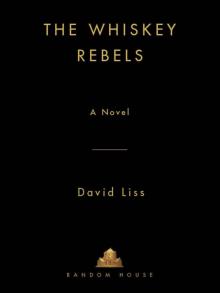 The Whiskey Rebels
The Whiskey Rebels Renegades
Renegades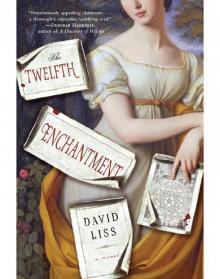 The Twelfth Enchantment: A Novel
The Twelfth Enchantment: A Novel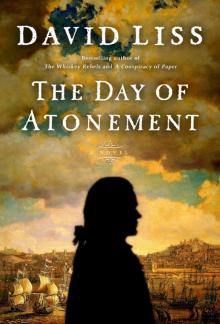 The Day of Atonement
The Day of Atonement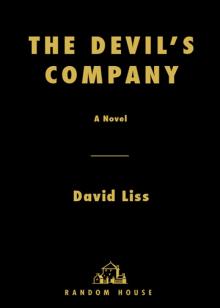 The Devil's Company
The Devil's Company Randoms
Randoms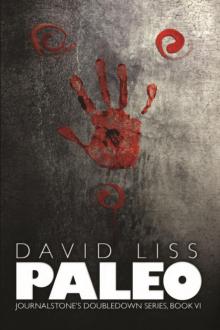 Paleo / The Doomsday Prepper
Paleo / The Doomsday Prepper Rebels
Rebels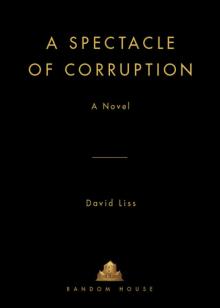 A Spectacle of Corruption
A Spectacle of Corruption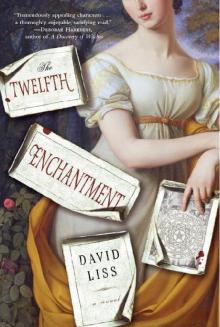 The Twelfth Enchantment
The Twelfth Enchantment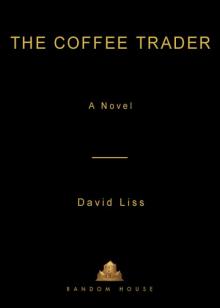 The Coffee Trader
The Coffee Trader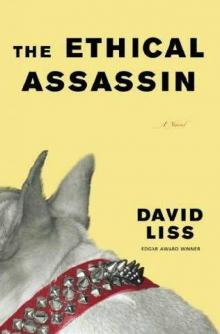 The Ethical Assassin
The Ethical Assassin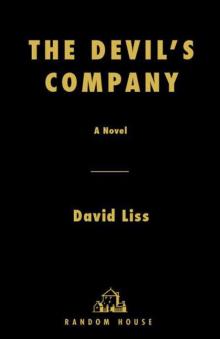 The Devil’s Company: A Novel
The Devil’s Company: A Novel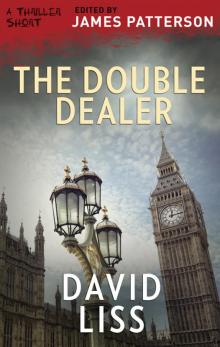 The Double Dealer
The Double Dealer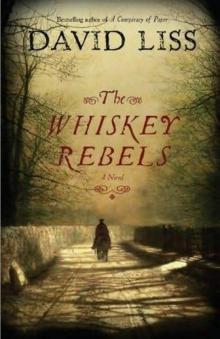 The Whiskey Rebel
The Whiskey Rebel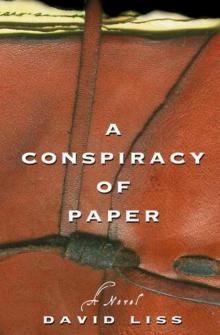 A Conspiracy of Paper bw-1
A Conspiracy of Paper bw-1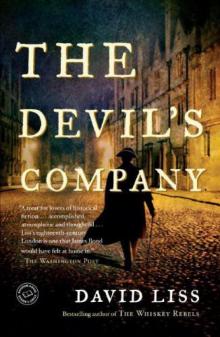 The Devil's Company bw-3
The Devil's Company bw-3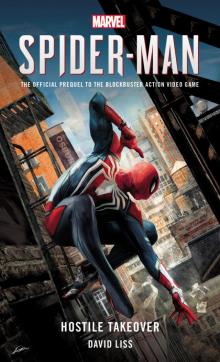 Marvel's SPIDER-MAN
Marvel's SPIDER-MAN